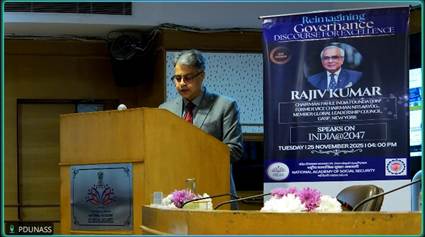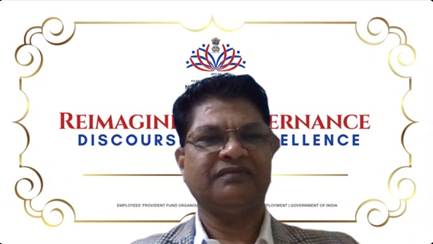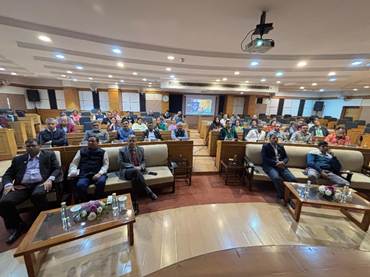Ministry of Labour & Employment
PDUNASS Hosts 23rd Session of Reimagining Governance: Discourse for Excellence
Dr. Rajiv Kumar Highlights Need for Universal Healthcare, Education and District-Based Development Architecture
Posted On:
25 NOV 2025 9:30PM by PIB Delhi
Dr. Rajiv Kumar, former Vice Chairman of NITI Aayog, delivered his keynote address at the 23rd session of Reimagining Governance: Discourse for Excellence (RGDE), where he lauded PDNASS for creating a rare and rigorous platform for governance dialogue—“a forum unmatched across both public and private institutions,” he remarked.

In his welcome address, Shri Kumar Rohit, Director, PDUNASS, reflected on the spirit behind the RGDE initiative, observing that “thought can lead to action, and reflection can lead to change.” He recalled the evocative lines quoted earlier in the day by the Hon’ble Prime Minister at Ayodhya, describing the “Chariot of Development” powered by valor and strength, yet steered by truth, character, compassion, and balance:
“Suraj dhiraj tehi rath chaka, satya sil drdh dhvaja pataka.
Bal bibek dam parhit ghore, ksama krpa samata raju jore.”
These virtues, he emphasised, must guide the nation’s governance transformation.

Dr. Rajiv Kumar set an expansive context for India’s long-term developmental thinking, referring to aspirations often discussed in policy circles—such as regaining India’s historical share of global GDP, joining the OECD, and moving toward the World Bank’s high-income threshold of USD 14,000 per-capita income. While acknowledging their relevance, he emphasised that these goals alone cannot define India’s future. What India truly needs, he argued, is to reimagine growth around a Gross Welfare Product, grounded in high levels of human development. Universal free healthcare, universal free education, and high-quality public infrastructure, he said, must form the core pillars of a capable and equitable society. The public sector must create these foundational assets, while private enterprise must accelerate innovation, R&D, and job creation.

Reflecting on India’s remarkable post-independence journey, Dr. Kumar noted that the country has achieved what few others have—a political transformation rooted in a resilient democracy, a social transformation marked by inclusion and affirmative action, and an economic transformation that has lifted per-capita income from USD 50 in 1947 to nearly USD 3,000 today. These successes, he said, show India’s inherent capacity to achieve far more, especially at a moment when China’s economic momentum appears to be slowing.
A major part of his address was devoted to the climate emergency, which he described as an existential challenge for Asia. He drew attention to the growing severity of the Asian Brown Cloud, the alarming rate of Himalayan glacier melt, rising sea levels, and widespread soil degradation. While applauding India’s growing emphasis on natural farming, carbon sequestration, and climate-aligned agriculture, he cautioned that adaptation and mitigation measures alone are no longer enough. India, he said, must design an indigenous development model rooted in its ecological sensitivities rather than replicate pathways that have harmed other regions.
Dr. Kumar highlighted India’s emerging strength in Digital Public Infrastructure (DPI)—from DIKSHA’s expansive digital learning ecosystem to Bhashini’s multilingual AI capabilities and the comprehensive digital-health architecture under the Ayushman Bharat Digital Mission. These platforms, he observed, are transforming service delivery at scale and attracting global attention from countries seeking inclusive, interoperable, and affordable digital solutions.
He called for a decisive reorientation of the Indian state—from a predominantly regulatory mindset to a promotional and enabling one—especially at the level of state governments. Dr. Kumar advocated the creation of a district-based development architecture, built on district-level GDP baselines, clear administrative KPIs, and collaborative monitoring frameworks involving government, industry, academia, and civil society. Such an approach, he said, would bring continuous, short-term accountability into the governance system and help accelerate local development outcomes.
On labour and social security, he underscored the need to expand manufacturing, reduce informality, and address youth unemployment. India, he said, is “a reservoir of extraordinary talent—waiting to be unleashed,” and the challenge before policymakers is to unlock this immense human potential.

Dr. Kumar concluded his address with a heartfelt personal reflection from his school days:
“Bharat hamara desh hai; iska hum par rin hai; iske liye kuch na kuch kar jaayenge.”
This spirit of responsibility and commitment, he said, must guide the nation as it marches toward 2047.
*****
Rini Choudhury/Anjelina Alexander
(Release ID: 2194438)
Visitor Counter : 441